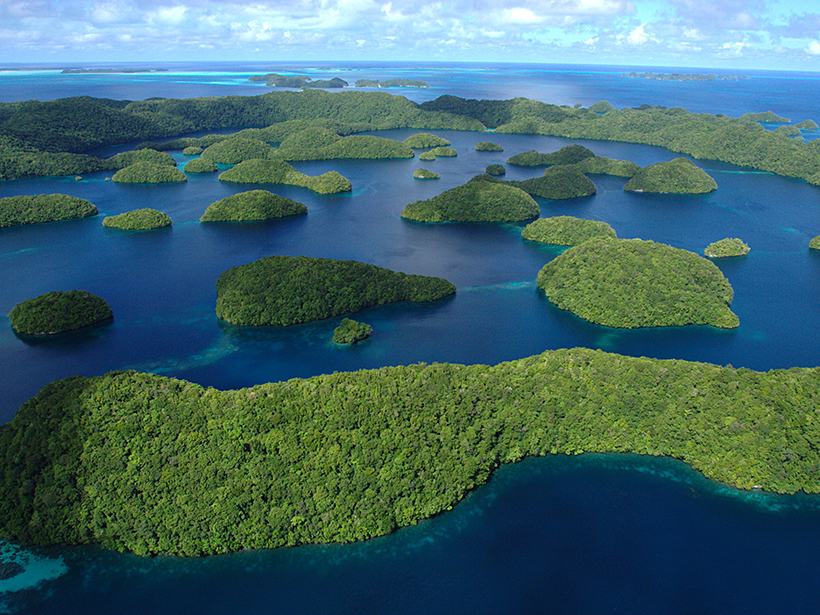Many island nations across the Pacific Ocean face greater threats from climate changes and associated changes in sea level and ocean acidification than most mainland countries. These island nations have low elevation, long coastlines, and a critical dependence on the seas around them for their livelihoods. The United Nations Environment Programme (UNEP) named 2014 the “Small Island Developing States (SIDS) International Year,” raising international attention on these small island countries.
The United Nations Environment Programme has called on the international community to take action with island nations to prepare themselves for disasters that may come as climate changes.
“Raise Your Voice, Not the Sea Level” served as the theme for last year’s World Environment Day, during which UNEP called on the international community to take action with island nations to prepare themselves for disasters that may come as climate changes. To this end, the Environmental Protection Administration of Taiwan developed and led an international conference and workshop.
Participants included scientists and policy makers from Taiwan, the United States, a number of the Pacific island nations, and Southeast Asia. The conference, held at National Taiwan University, drew more than 300 attendees. In addition, the presentations and panels were broadcast live to various universities and colleges in the region.
Conference goals included the following:
- promoting public awareness and enhancing communication among decision makers, subject matter experts, and academia about policy making, adaptation strategies, tool development, and implementation pathways
- identifying and prioritizing issues that span the Pacific, establishing public and private partnerships, and facilitating adaptation policies and the exchange of information on mitigation strategies
- exploring the possibility of establishing a “Climate Change Adaptation Center” as a hub for research and education to promote usage of open and big climate data, as well as organizational networking
Many presentations focused on the need for adaptation policies. For instance, because of sea level rise and increases in extreme events, island countries and Southeast Asian nations confront the dilemma of adapting to changing conditions for survival, stimulating economic development, and/or meeting human needs. In some cases, such as those of the Republic of Palau and the Republic of Kiribati, the entire nation’s existence is threatened. To better adapt to climate change, international cooperation is required to improve climate-related legislation, policy-making processes, human capabilities, education, technology, and financial support.
Speakers also called on scientists to push harder for policy makers to include climate adaptation planning in decisions.
Speakers also called on scientists to push harder for policy makers to include climate adaptation planning in decisions. As part of this effort, the meeting participants concluded that a formal international environmental partnership should be established that would include representatives from the United States, the Southeast Asia nations, and Pacific island nations. Such a partnership could strengthen efforts, remove barriers, pursue sustainable development, and promote creativity. A strong international partnership is essential to support ambitious domestic action.
After the conference, 35 participants from 7 nations spent 2 days at a workshop, discussing the stresses of climate change. Workshop attendees discussed adaptation policies specifically for Pacific island nations. Participants reiterated the need for establishing an international platform for cooperative efforts to adapt to climate change together. To continue the efforts, a follow-up meeting to be held in Vietnam is planned for autumn 2015.
Acknowledgment
We give special thanks to Chi Ming Peng of WeatherRisk Inc. (Taipei, Taiwan) and S. K. Yang of the National Oceanic and Atmospheric Administration’s Climate Prediction Center (College Park, Md.) for the outstanding contributions they made to organizing this meeting, as well as their contributions to this report.
—Donald Wuebbles, Department of Atmospheric Sciences, University of Illinois at Urbana-Champaign, Urbana; email: [email protected]; Wayne Higgins, Climate Program Office, National Oceanic and Atmospheric Administration, Silver Spring, Md.; and Hui-Chen Chien, Environmental Protection Administration, Taipei, Taiwan
Citation: Wuebbles, D., W. Higgins, and H.-C. Chien (2015), Focusing attention on climate change and Pacific island nations, Eos, 96, https://doi.org/10.1029/2015EO033665. Published on 3 August 2015.
Text © 2015. The authors. CC BY-NC 3.0
Except where otherwise noted, images are subject to copyright. Any reuse without express permission from the copyright owner is prohibited.

